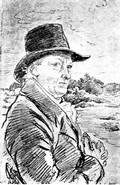 “In 1757 William Blake was born in London; in 1827 he died there; where he has been since 1827 I do not know.” This wonderful line opens Harold Bruce’s William Blake in This World, and that spirit of cheerful skepticism permeates the whole book.
“In 1757 William Blake was born in London; in 1827 he died there; where he has been since 1827 I do not know.” This wonderful line opens Harold Bruce’s William Blake in This World, and that spirit of cheerful skepticism permeates the whole book.
“I doubt if a soul is to be understood, or a ghost to be saved by whitewashing,” Bruce writes in response to a century’s worth of attempts to fit Blake’s wildly original imagination into a more conventional and Victorian form. Instead of following tradition, laying out the story of Blake’s life in chronological order and drawing lessons from its successes and failures, Bruce takes what was, at the time, a very novel, Modernist approach:
To try to sift fact from romance, to try to erase the details of Blake’s life not backed by competent, material, and relevant evidence, will be to blur a smooth and highly-finished portrait, and to substitute a flawed and imperfect one, with lines sometimes dim, wavering, or blotted out. But this portrait, traced by Blake’s own words and by the memories of those who knew him, however flawed and imperfect it turns out to be, has certain sharply clear lines, and is at least a partial likeness of him as he was.
William Blake in This World is a collage, a view of Blake’s life and work from a variety of perspective, studded with quotations from his poems, letters, and the recollections of his contemporaries. He looks at Blake in terms of his view of religion and revolution, of the early signs of the Industrial Age and the mundane demands on his energy of politics and commerce. Bruce addresses the question of Blake’s mental health: was he locked up in Bedlam as a madman at one point?
Today, the book would probably be classed as criticism, but Bruce’s interest is strictly biographical. If Bruce has any particular message, it is that, however ethereal and visionary Blake’s spirit was, it resided in the breast of a man very much of his own time and place. Although I found the author’s own prose at times too elliptical and tangential to follow, there is no doubt that in William Blake in This World, Harold Bruce is a vigorous defender of his subject’s right to be himself.
